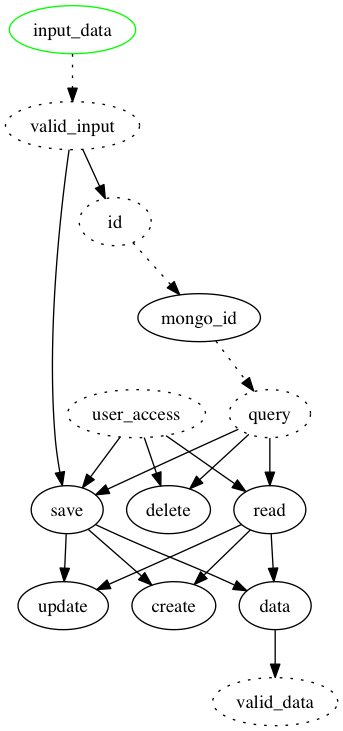Example CRUD with clues
clues-crud is a very flexibile implemention of CRUD on top of mongoose. In the default setting you just need to provide a $model and define a function for where user_input comes from (if any) and how the _id of each query is defined.
Example:
crud({
$model : exampleModel,
user_access : {},
input_data : ['input.exampleInput', Object],
id : ['input.id', Object]
})
The following CRUD commands are available:
-
create- creates a record if one doesn't exist already -
read- returns saved data (it exists) -
update- update a record (if exists) -
delete- deletes a record
A more advanced endpoint is valid_data. This endpoint allows for a final transform/validation and returns either the input data that was just saved (if valid input data was provided and saved successfully) or the most recently saved data (in any other case).
There are two points of validation, the first one on the way in valid_input and the second one on the way out valid_data. Usually you only need to define one of them, depending on whether you want partial/unvalidated data saved or not. If valid_input is a simple passthrough and valid_data performs the validation, any changes/updates are saved but further use of the data will be trapped by the valid_data validator. If 'valid_input' performs comprehensive validations, updates will not be saved unless they pass validation.
Crud dependency graph
API Reference
$model (required)
A placeholder for the mongoose data model
user_access (required)
Should return an object that constrains any queries to objects that should be accessable to this user. For more fine-grained control you can define read_access and write_access (both by default mirror the user_access object). For unlimited access simply set user_access to an empty object {}.
input_data (required)
Custom function required to provide the set of inputs for any update/create. Example:
input_data : ['input.data_entry', Object]
valid_input (optional)
This function checks the input_data for potential errors before passing the data to update/create. By default, this function goes through the mongoose validators and throws an error with object xflash containing the field-level messages. It also enforces the defined mongoose models (fields that are not in the model aren't propagated).
id (optional)
The string representation of the mongo id. By default this value is fetched from either the submitted input object or input.id. Should be overwritten to provide a more precice mapping.
mongo_id (internal)
Function that converts the string id into a proper ObjectId if necessary.
query (optional)
The default query is simply a search for an _id that matches the supplied mongo_id. In some cases you need to overwrite the query function to use a different a different unique identifier than _id (for example when multiple users might have overlapping unique identifiers for any records).
create
This function creates a record from valid_input if the record doesn't already exist and input was successfully validated.
read
Reads a single record and returns the result.
update
Updates a record found with 'query' using 'valid_input'. If the record does not exists, validation failed or the user has no access, an error is thrown.
delete
Deletes a record specified with 'query'
save
Saves the record, either by updating a previously existing record or by creating a new one (if a corresponding record does not exists)
data
Returns either the updated/created data (if valid_input was provided and save successful) or the previously saved data (if a record exists).
valid_data (optional)
This is a placeholder for any validation of the data coming out.
